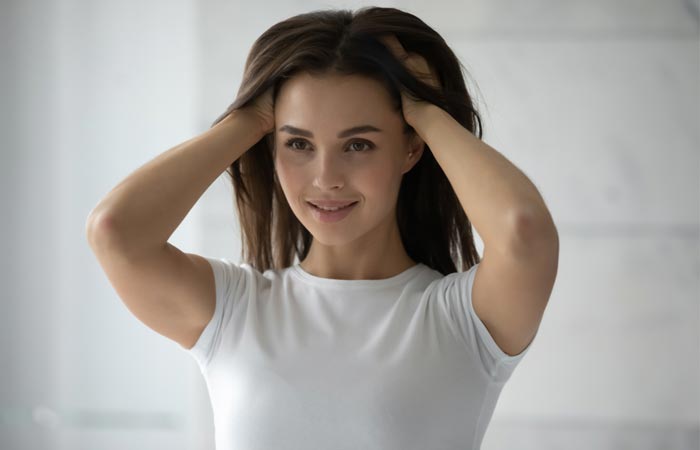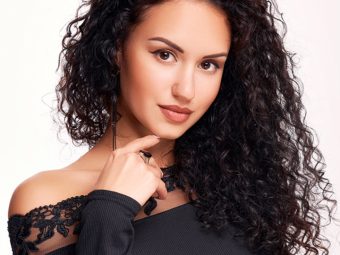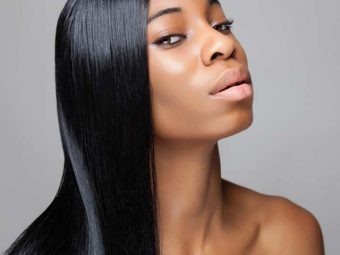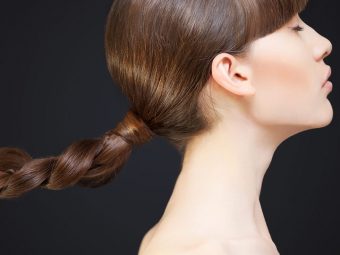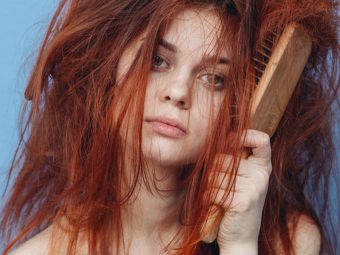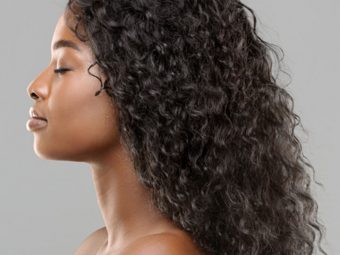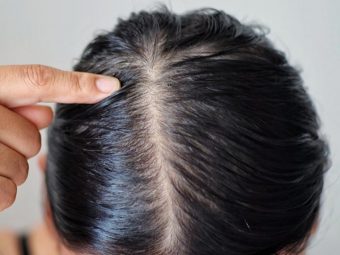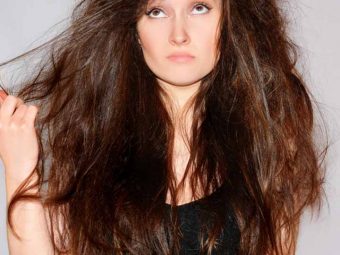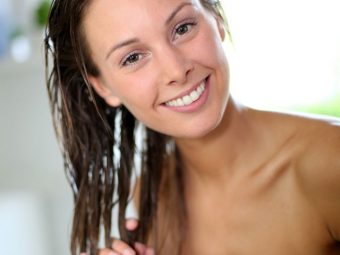Lavender Oil For Hair – How To Use, Benefits, & Side Effects
Learn how to indulge yourself in the soothing aroma of this essential oil.
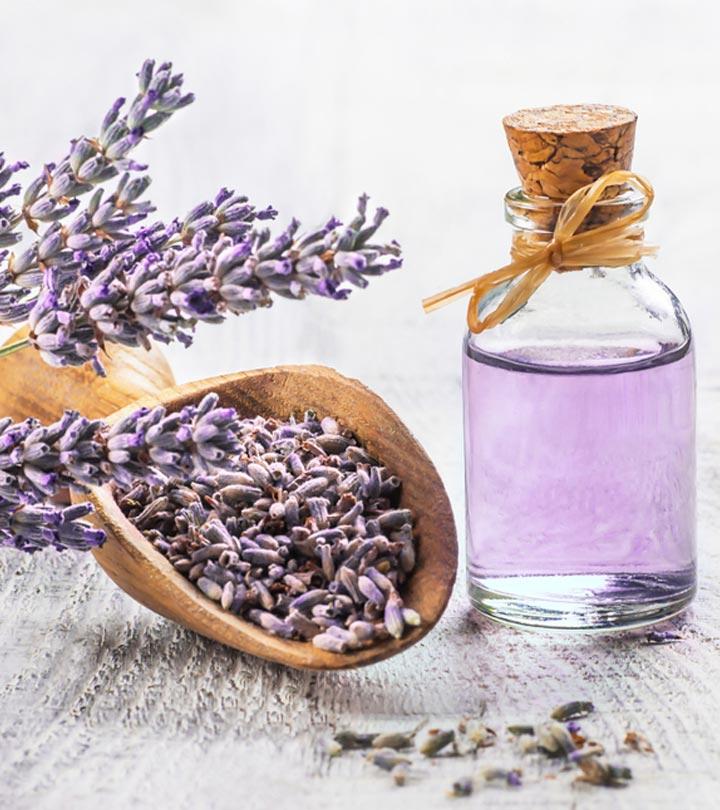
Although famous for its soothing, relaxing, and stress-relieving aroma, scientific and anecdotal evidence suggests there are merits to using lavender oil for hair. The oil might stimulate hair growth and keep your hair thicker and stronger. It may even stop hair loss, reduce itching, decrease dandruff, and eliminate head lice. Keep reading to know how to use lavender oil to attain beautiful flowy hair.
In This Article
What Is Lavender Oil?
Lavender oil is obtained by the distillation of lavender flowers and lavender spikes. The oil obtained from the flowers is colorless, has a soothing aroma, and contains a complex mix of phytochemicals. Lavender oil is used as a perfume, in aromatherapy, and for massages.
What is the relation between lavender oil and hair growth? Scroll down for a list of reasons lavender oil is good for your hair.
How Lavender Oil Works For Hair Growth
- Promotes Hair Growth: Korean scientists found that the topical application of lavender oil once a day for four weeks increased the number of follicles and stimulated hair growth in laboratory mice (1). However, more studies on humans are required to understand why and how lavender oil promotes hair growth.
- Improves Blood Circulation: Applying lavender oil to the scalp and gently massaging it in a circular motion helps improve blood circulation to the scalp. This helps the nutrients reach the follicles, making them stronger, and preventing hair loss.
- Kills Head Lice: Head lice are a menace. The parasites feed on the blood on the scalp and weaken the hair, leading to hair fall and dull hair. A study shows that a combination of lavender oil and tea tree oil can prevent or even suffocate head lice (2).
- Has Antimicrobial Properties: Lavender oil has antimicrobial properties and is effective against bacteria and fungi (3). This property of lavender oil may help reduce itchy scalp, dandruff, and other infections caused by microbes on the scalp.
- Has A Calming Effect: Sudden hair loss, hair thinning, and bald patches can cause stress and anxiety. This can further aggravate hair fall. Lavender oil has a calming effect that helps reduce anxiety (4). Hence, applying it to your scalp is a great way to relax and reduce stress.
What is the best way to apply lavender oil to your hair? Scroll down to know the different options.
How To Use Lavender Oil On Your Hair
Shutterstock
- Massage Lavender Oil: Comb your hair and divide it into sections. Massage two drops of lavender oil onto one section in a circular motion for 2 minutes to help the oil penetrate the deepest dermal layer of the scalp and hair follicles. Repeat the process all over the scalp. Take 10 drops of lavender oil in your palms and run them through the hair strands. Tie your hair up in a bun. Wait for 30 minutes before washing it off your hair with a good shampoo.
- Use Lavender Oil As A Serum: The beautiful aroma of lavender oil will add a calming effect, make your hair shiny, and prevent the need for perfume.
- Add Lavender Oil In Hair Products: Adding a few drops of lavender oil to your shampoo, conditioner, hair oil, or hair serum can help you reap its benefits without having to spend a lot of time on hair care every day.
- Buy Products With Lavender Oil: Check the labels of shampoos, conditioners, oils, and serums for ingredients like lavender essential oil or lavender hydrolate. You can buy these products and use them to avoid the extra step of adding lavender oil to your hair care products.
- Lavender Oil In Hair Masks: You can mix a few natural ingredients like coconut oil or almond oil along with lavender oil to prepare a deep conditioning hair mask for dry and damaged hair. Apply it to the scalp and hair strands and massage well. Wash off after 30 minutes. Do this once a week.
What are the benefits of using lavender oil for hair? Find out in the next section.
Benefits Of Using Lavender Oil
- Helps promote hair regrowth.
- Rejuvenates damaged and dull hair.
- Suitable for all hair types.
- Helps reduce dandruff and head lice.
- Helps to relax and calms the nerves.
- Can easily be mixed with other oils and hair care products.
- Can also be used for body massage.
- Easily available.
But before you start using it, should you be aware of any side effects lavender oil may have? Scroll down to know.
Are There Any Side Effects?
Using too much lavender oil may irritate your scalp or skin. Do a patch test before you use the oil on your hair. Massage your scalp with a minimum amount of the oil. Mixing lavender oil in a carrier oil like coconut oil or almond oil can also help. If the aroma is too strong for you, you may dilute it with olive oil before applying it to your scalp. Do not consume it under any circumstances, and keep it away from children and pets.
Using lavender oil for hair is one of the best ways to promote hair growth and increase its volume. It has antimicrobial properties, kills lice, improves hair texture, boosts blood circulation, and soothes your scalp. You can use lavender oil as a massage oil or serum, add it to your hair care products, hair masks, or buy products with lavender oil. Though it suits all hair types, you must know its side effects. Excess use of lavender oil can irritate your scalp. So, always do a patch test before applying it for the first time.
Frequently Asked Questions
Does lavender oil darken hair?
Yes, lavender oil helps darken the hair. If applied regularly, it can improve hair color and texture.
Is lavender oil good for colored hair?
Yes, lavender oil is good for colored hair. It helps manage the dryness and frizz associated with colored hair.
Key Takeaways
- The topical application of lavender oil increases the number of hair follicles and stimulates hair growth.
- It has antimicrobial properties, which combat many scalp infections and dandruff.
- It can be used as a serum or added to hair masks, shampoo, or conditioner.
Sources
- Hair Growth-Promoting Effects of Lavender Oil in C57BL/6 Mice
https://www.ncbi.nlm.nih.gov/pmc/articles/PMC4843973/ - An ex vivo, assessor blind, randomised, parallel group, comparative efficacy trial of the ovicidal activity of three pediculicides after a single application – melaleuca oil and lavender oil, eucalyptus oil and lemon tea tree oil, and a “suffocation” pediculicide
https://bmcdermatol.biomedcentral.com/articles/10.1186/1471-5945-11-14 - Antimicrobial Properties of Plant Essential Oils against Human Pathogens and Their Mode of Action: An Updated Review
https://www.ncbi.nlm.nih.gov/pmc/articles/PMC5206475/ - Essential oil of lavender in anxiety disorders: Ready for prime time?
https://www.ncbi.nlm.nih.gov/pmc/articles/PMC6007527/



